| |
The City Council will request a report on this as an emergency item tomorrow night.
Financial abuse, mismanagement leave housing agency on verge of takeover
Feb 17, 2014
Amy Julia Harris
From KQED News
RICHMOND, Calif. – Richmond’s public housing agency has been racked by years of mismanagement, financial abuse and conflicts of interest, The Center for Investigative Reporting has found.
The Richmond Housing Authority is running a nearly $7 million deficit and has to repay $2.2 million for past contracting mistakes. The federal government is threatening to take control of the housing authority this year if key financial benchmarks are not met.
In 2012, Richmond failed to collect more than $157,000 in rent from tenants, according to the U.S. Department of Housing and Urban Development’s most recent inspection.
As its finances spiraled out of control and residents’ basic needs went ignored, the authority spent lavishly, records show.
Its executive director, Tim Jones, charged hundreds of dollars on meals in New York and Washington, including a roughly $400 meal at an upscale midtown Manhattan restaurant where a strip steak with truffle fries runs $41.
The meals cost as much as many public housing tenants pay each month in rent.
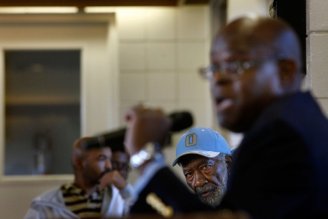
John Oliver, 76, center, a 10-year Nevin Plaza resident, listens as Richmond Housing Authority Executive Director Tim Jones, left, explains issues at a Housing Advisory Commission meeting last October.
Credit: Lacy Atkins/San Francisco Chronicle
Jones’ pay also increased about 30 percent over three years as the authority ran up debt.
Meanwhile, the housing authority’s finance manager improperly used public money for personal use, putting gas and meals on the agency credit card, records show. Federal inspectors in 2012 called his financial knowledge inadequate, saying he routinely failed to provide basic paperwork detailing the authority’s finances. He’s still working at the agency.
The authority also made several late payments on the agency credit card, triggering late fees, records show.
HUD discovered that the No. 2 man at the agency had steered contracts to his brother and wanted him banned from doing work with the federal government. Two years later, the housing authority paid for his retirement party, violating city rules.
These revelations come on top of CIR’s findings of deplorable conditions for residents who occupy the authority’s two largest housing complexes. Residents there are dealing with severe rodent and insect infestations, mold-ridden walls and a slow reaction to fix basic maintenance problems like plumbing leaks and broken heaters.
Lax security has enabled squatters to take up residence in some of the authority’s vacant units. Richmond now ranks among one of the nation’s worst public housing authorities, according to federal data.
To tell this story, CIR reviewed hundreds of pages of HUD audits, internal memos and report cards dating back a decade that show the troubled housing authority veering further and further out of control. Until now, the story of the housing authority’s financial abuses has not been told.
“The place is being badly managed, poorly managed, and something has got to change,” said Jackie Thompson, a resident who serves on the authority’s tenant advisory commission.
Jones has been in charge since 2005. He blames the housing authority’s troubles on his predecessor. He said the authority has cut its staff significantly, has a plan to get out of debt and is working closely with HUD to make fixes.
“When I arrived, we had a staff of 65,” Jones said. “Now there’s a staff of about 28. We are lean here. There is no fat.”
Jones did not respond to numerous requests for follow-up interviews once the extent of the authority’s financial abuses became clear.
Bill Lindsay, Richmond’s city manager, has asked HUD to give Jones a chance to turn the authority around.

City Manager Bill Lindsay acknowledges there are problems at the Richmond Housing Authority, but he has asked federal officials to give the agency’s executive director, Tim Jones, a chance to turn things around. Lindsay took over the housing authority’s finances in 2012.
Credit: KQED
“He inherited some terrible staff that he can’t unload,” he said. “He took something that was in dismal shape, and he made cuts and stopped this place from really heading for financial disaster.”
But the documents show how the financial problems and mismanagement have festered on Jones’ watch.
“The current executive director has been there approximately 6 years, but few improvements have been made,” according to a June 18, 2012, HUD memo. “The financial condition of the authority has gotten worse by the year, and based on audit findings from as far back as 2009 … the total lack of internal controls has contributed significantly to the authority’s current condition.”
The abuses weighed on the minds of HUD officials, who wondered in memos whether firing Jones would solve the problems. But the memos say that Mayor Gayle McLaughlin and the City Council likely would oppose such a move and that there was no qualified successor in the organization.
It’s now do-or-die for the Richmond Housing Authority.
After years of being warned about money and bookkeeping problems, it is being forced to overhaul its public housing operation. HUD says that so far, Richmond is making progress. But officials there have threatened to seize control of the authority if key benchmarks – such as turning in audits on time and getting out of debt – are not met this year.
To get out of debt and pay fines, Richmond is selling an apartment complex that was supposed to be a long-term source of funding for the agency. Officials also said they have a more permanent solution. They have a $65 million plan to refurbish four of the authority’s five public housing complexes and turn them over to private management.
The fate of its worst complex, Hacienda, is still undecided.
Improper contracts
The Richmond Housing Authority gets about $26 million a year from the federal government to provide safe and decent housing for the needy. In addition to its 715 housing units for poor, elderly and disabled residents, the authority provides Section 8 vouchers to 1,750 Richmond residents who can use these subsidies to pay rent anywhere in the city.
In 2005, the authority was in trouble.
The executive director lacked basic skills, its files were in shambles and staff couldn’t carry out rudimentary bookkeeping, documents show. Federal auditors swooped in and came up with a 250-point plan on how to turn around the agency. One of their solutions: Hire a qualified executive director.

Richmond Mayor Gayle McLaughlin blames the U.S. Department of Housing and Urban Development for cutting public housing agencies’ budgets. She says she was not aware of financial abuses at the Richmond Housing Authority.
Credit: KQED
Richmond brought in Jones, the Oakland Housing Authority’s housing management director, to fix the broken agency. For a few years, it looked like he’d turned the place around. Employees got basic training. A new activist mayor, McLaughlin, made economic injustice a rallying cry.
Then HUD got a tip that something was amiss.
Manuel Rosario, Jones’ No. 2 man at the agency, had steered $61,000 in contracts to his brother in 2008 and 2009, HUD’s inspector general found. Rosario sat on a committee that gave his brother’s company an inspection contract. Months later, the contract was renewed for a year even though it didn’t have an option to be extended.
Rosario, HUD documents say, also arranged for his brother to get more housing authority work. Jones was supposed to sign off on these documents. But he didn’t.
In a properly run system, the absence of these basic functions would have raised red flags. HUD wanted Rosario banned from working with the federal government in 2009. Jones wouldn’t say whether he fired Rosario, but the agency did pay for his retirement pizza party with taxpayer funds, records show. City policies prohibit spending public money on these kinds of events. It’s unclear from the records how much the party cost.
Rosario could not be reached for comment.
In total, the federal investigation found the agency had misspent $2.4 million on contracts over the previous decade. While some of that activity occurred under the previous leadership, the report uncovered a host of misdeeds by the new management team.
The authority messed up its competitive bidding process for contracts, and it approved payments to contractors without proof that the work had been done.
HUD trained authority staff on how to write and manage contracts. Jones, meanwhile, began overseeing contracts. But the problems continued. In 2012, seven out of 25 housing authority payments reviewed by auditors didn’t have documents that backed up the work that was done.
“The executive director claims he is now the procurement officer, but despite attending procurement training, he lacks the procurement knowledge required to comply with requirements and disregards many requirements,” according to a 2012 internal HUD memo.
Jones, who by this point had been on the job for more than six years, continued to blame the previous administration for the breakdown in contracts. “We’re trying to find a way to fix it,” he said in an interview with CIR.
The housing authority is in the process of repaying $2.2 million for its contracting mistakes. It made its first payment in July. The agency told HUD that the payments would “severely undermine the Housing Authority’s fiscal stability.”
Excessive expenses
HUD delivers an annual report card on each of the more than 4,000 housing agencies across the country. And Richmond’s low marks have placed it among the nation’s worst housing authorities every year since 2009.
The Richmond authority repeatedly has missed its deadlines to file annual financial reports with HUD. If it had turned in the audits on time, federal officials would have seen sooner that Richmond was running out of money.
The agency has overspent its budget nearly every year since 2007. Instead of making ends meet, the housing authority regularly went to the city to help pay its workers’ salaries, gradually piling up debts.
After Richmond got low financial marks again in 2011, HUD sent in a team of specialists.
The specialists found that as the housing authority was going deeper into a financial hole, top officials were loading up the expense accounts.
On a trip to New York in November 2009, Jones got the authority to pay for a $417.34 meal at Fabio Piccolo Fiore, a high-end Italian restaurant, HUD documents show. In Washington, he had taxpayers fund $130.60 and $279.90 meals at an upscale soul-food restaurant called Georgia Brown’s in 2008 and 2010.
HUD found the charges to be excessive, according to a review that stretched from 2008 to 2011. In addition to charging the meals, Jones appears to have billed taxpayers a $40 stipend each day he traveled, records show. Government officials are supposed to limit their meals to the per diem costs, so they shouldn’t be charging meals at all.
Jones also charged taxpayers for meals closer to home. He took his staff to the Italian restaurant Salute E Vita, which overlooks the Richmond marina, three times in three weeks, racking up tabs as high as $195. In the three years reviewed by auditors, Jones charged 23 meals from this restaurant at an average of about $80 a meal, HUD records show.
The City of Richmond’s policy specifically prohibits employees from expensing work lunches with other city employees.
Jones approved all his own credit card charges with no outside oversight. “There were no internal controls to ensure that such activity does not occur,” auditors wrote. Jones declined to comment on the credit cards.
One of the few people who could have spotted the abuse was the finance manager. But he also was abusing his credit card, documents show.
Tony Taplin, the housing authority’s finance manager, used the card to fix his car, fill it with gas and buy personal meals. The city said all unauthorized purchases were eventually repaid.
Taplin didn’t respond to requests for comment.
The housing authority also catered its Board of Commissioners meetings, which consist of the City Council and advisory commission members. One catering bill in 2008 came to $2,142.24.
City officials have since canceled the agency credit cards.
As the finances worsened, Jones’ salary kept rising. The city’s community and economic development director gave Jones a total of 31 percent in raises from 2008 to 2011, at a time when the agency didn’t have enough money to make payroll, HUD auditors found. Auditors described the raises as aggressive.
In the year after the housing authority first was labeled one of the worst in the country, Jones made $205,000 in salary and benefits, according to a survey four years ago of housing authority executives in California. He was in the top third of the highest-paid housing heads in the state, according to the HUD survey.
His pay since has dropped as the housing authority’s budget has gone down. In 2012, he made almost $187,000 a year in salary and benefits, according to city payroll records. HUD no longer ranks executive director pay.
In 2012, the agency ran $5.8 million into the red. By 2013, it owed the city almost $7 million.

Richmond Housing Authority Executive Director Tim Jones hands out copies of notes from a previous meeting to residential council leaders from the city’s public housing properties. Jones blames years of federal funding cuts for the problems plaguing the authority.
Credit: Lacy Atkins/San Francisco Chronicle
Jones would not answer questions about his pay or his expenses.
He said the agency’s finances are getting better. “Our mission is our mission. It can be done as long as we’re trending north,” he said.
HUD found problems beyond the staff. Its inspectors faulted the board, which includes the mayor, for allowing the agency to rack up debt year after year.
“The Board of Commissioners do not appear to have sufficient knowledge of Housing Authority operations, programs, financial condition, or activities, and as a result, have not provided proper oversight of the Executive Director,” according to a 2013 HUD document.
The executive director reports directly to the city manager. The City Council occupies seven seats on the nine-member authority board. An advisory board of residents and community members can make recommendations. And HUD inspectors audit and inspect the housing units annually.
Lindsay took over the housing authority’s finances in 2012. McLaughlin, who as mayor serves as board chairwoman, said she was not aware of the financial abuses at the agency or Jones’ pay increases.
She said once Richmond completes the sale of one of its buildings, it will be debt-free and off HUD’s troubled list. She also pointed the finger at HUD for cutting public housing budgets.
“HUD needs to realize that the federal government is being negligent in its responsibility to provide public housing funds for cities that have experienced decades of economic injustices,” she said.
When later confronted with questions about Jones’ expenses and pay, McLaughlin deferred to Lindsay.
There is only one other housing authority in California that is currently on the troubled list: San Francisco. After it was labeled troubled, Mayor Ed Lee cleaned house. He replaced most of the members of the board of commissioners and hired a new executive director.
There has been no such change in Richmond.
Troubles with rent collection
Richmond’s most recent federal report card is its worst yet.
Housing agencies are rated on a 100-point system, and Richmond got a 47 on its report released in 2013. Anything below 60 is failing. In addition to financial problems, HUD gave the authority failing marks for its management.
The housing authority is essentially a landlord: It’s supposed to collect tenants’ rent, ensure properties aren’t in disrepair and make sure that people in public housing qualify for the subsidy. But hundreds of thousands of dollars of rent has gone uncollected. The authority also has fallen behind on checking residents’ incomes.
Last year, the Richmond Housing Authority was one of the only agencies in California that hadn’t completed the minimum number of income checks for residents, according to federal data. Without checking these finances, tenants could be charged too much rent, or they might make too much money to qualify for public housing.
The dysfunction trickles down to tenants living in the housing projects.
Residents say the agency routinely misplaces their checks and slaps residents with a $25 late fee even when they pay on time. For residents on a fixed income, they say that can mean five meals.
Juanita Hasnat is a double amputee and former nurse. She has lived in Richmond public housing for more than three years. She said she’s paid her $233-a-month rent on time each month since she moved in. But last month and this month, she got a note from the housing agency that she was late on rent and had to pay a penalty.
“If your people put it in late, it’s not on me,” Hasnat said at a public meeting in January.
Jones told her that he’d look into the issue and, if Hasnat was correct, he’d give her an apology in writing.
The Housing Advisory Commission, a group of tenants and community members that airs resident complaints, repeatedly has brought up the late rent issue to no avail.
“It’s management,” said Commissioner Sylvia Gray-White. “They don’t seem to have a clue what they’re doing.”
This story was edited by Andrew Donohue and Mark Katches. It was copy edited by Nikki Frick and Christine Lee.
Richmond Public Housing Residents Say They’re Plagued With Filth, Vermin, Mold and Raw Sewage
http://blogs.kqed.org/newsfix/2014/02/11/residents-live-in-filth-in-mismanaged-richmond-public-housing/
The Center for Investigative Reporting | February 17, 2014
By Amy Julia Harris, The Center for Investigative Reporting
RICHMOND, Calif. – Geneva Eaton has learned to deal with life in Hacienda: the stench of mold from the stairwell in front of her door, the winter she spent huddled at her stove for heat, the broken security gate that allows drug dealers and squatters to walk past the paid security guards and urinate on her doorstep. But the mice were too much.
For eight months, the 73-year-old woke to handfuls of half-dead mice wriggling in the glue traps lining the floors and cupboard of her apartment. In the space of a few hours, she caught 12. She put her nicest family belongings into storage. She went to bed with the lights on, afraid that the vermin she heard chewing through her walls would bite her in her sleep.
Officials at the Richmond Housing Authority know the Hacienda high-rise, one of its five public housing projects, is infested with mice and roaches. Residents have filed more than 80 complaints about it in the past year, according to agency records. But maintenance workers had done little to fix the problem. So for months, Eaton lived a daily routine: She threw out food she could barely afford. She called a maintenance line for help. She bathed her walls in bleach in the hopes of scaring away the insects.
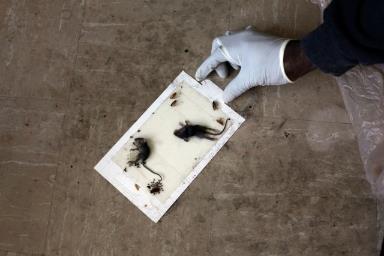
For months, Geneva Eaton woke to handfuls of half-dead mice wriggling in her glue traps. (Lacy Atkins/San Francisco Chronicle)
Eaton lives in one of the worst apartment buildings managed by one of the worst public housing agencies in the country. Here in Richmond, some of the poorest, oldest and most vulnerable people in the Bay Area live in squalor and fear due to the housing agency’s mismanagement and neglect, The Center for Investigative Reporting has found.
There were at least 16 life-threatening health and safety violations at the five public housing projects managed by the housing authority, according to the two most recent years of U.S. Department of Housing and Urban Development reports. Seniors and disabled residents lived amid exposed wiring and missing smoke detectors and fire alarms. Most well-kempt housing projects don’t have these major health and safety violations, HUD says.
The authority’s executive director, Tim Jones, said he’s “running an operation on life support.” He blamed years of budget cuts from the federal government for the problems plaguing the housing authority and insisted that the agency is on the road to recovery. He said the problems come down to money.
Nearly one in five apartments in the Hacienda and Nevin Plaza complexes are infested with insects and cockroaches, inspection records show.
Then there are the indignities that don’t show up in formal government reports: A woman with no legs giving herself sponge baths from her bathroom sink because maintenance workers didn’t install a simple safety bar in her shower. The fire department rescuing a paralyzed veteran from his third-floor apartment because the elevators didn’t work for three days. A disabled man who watched in horror for nearly a month as raw sewage slowly dripped from the neighbor’s bathroom upstairs.
Residents say their pleas for basic maintenance are ignored by officials paid to provide services to the poor.
CIR also found a number of cases in which housing authority workers claimed in official documents to have fixed problems. But they hadn’t.
“It’s just continual chaos here,” said Everett Dennis Lewis, a disabled resident of Hacienda. “The housing authority doesn’t give a crap.”
There are 4,055 public housing agencies in the United States, all overseen by HUD. Last year, the federal government labeled 44 as “troubled” – housing authorities that had such severe problems with their finances, management or living conditions that the government was on the brink of shutting them down.
Richmond was one of them.
In the most recent federal assessment reports, released in 2013, Richmond received a score of 47 out of 100, one of the lowest rankings in the country. It received failing marks for running up debt and failing to track its finances. Its executive director was deemed ineffective.
Richmond managed to receive a passing grade for the condition of most of its apartments. For the most part, the projects in Richmond aren’t as dilapidated as those in Detroit and New Orleans. But the breakdown in finances and leadership manifests itself daily at Richmond’s two largest – and worst – complexes as residents struggle with rodents, filth and security problems.
“They are a dysfunctional organization,” said Gerard Windt, division director of the HUD office that oversees Richmond.
The Richmond Housing Authority got $26 million in 2013 from the federal government to provide safe and decent housing for the needy. Richmond has 715 units of public housing for the poor, elderly and disabled. It also gives out Section 8 vouchers to subsidize rent for an additional 1,750 residents on the private market.
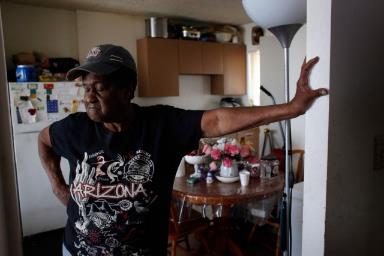
Geneva Eaton says she has lost any hope that the Richmond Housing Authority will help with problems at its Hacienda apartment complex.“I wanna go someplace else, but I don’t have anywhere else to go,” she says. “They treat us like animals here.” (Lacy Atkins/San Francisco Chronicle)
Residents who end up in Richmond’s public housing are predominantly old or disabled African Americans. More than three-quarters of them make less than 30 percent of Contra Costa County’s median income, or $18,750 a year, according to HUD. Many of them used to have jobs as grocery baggers, janitors and food service workers until they got old or sick. Some lived on the streets, and others struggle with addiction.
Residents don’t get their apartments for free. Almost 90 percent pay between $200 and $500 a month in rent, according to HUD. Eaton pays $262 a month to the housing authority.
All 4,000-plus housing authorities across America face these same slashed budgets. About 1 percent of those agencies find themselves on HUD’s troubled list.
Maintenance complaints neglected
When Juanita Hasnat moved into Nevin Plaza in 2011, the housing authority knew she was disabled. But her apartment didn’t have a simple disabled access fixture: a safety bar in the bathtub.
Hasnat told the housing authority about the oversight, thinking it would be a quick fix. But it took the agency nine months to install the safety bar, a fixture that costs less than $40 at The Home Depot.
The 47-year-old gave herself sponge baths out of her bathroom sink for months because she couldn’t maneuver out of her wheelchair and into her bathtub.
Hasnat said she repeatedly called the housing authority, and Jones directly, to ask for help.
“They all said, ‘We’re gonna get it taken care of,’ ” she said. “But I didn’t believe them. These people say one thing and do the opposite.”
Not too long ago, it was Hasnat who was taking care of the sick and elderly. She worked as a certified nursing assistant at hospitals in Richmond and El Cerrito, cleaning patients’ wounds and giving them sponge baths. She didn’t expect to be in the same position.
Hasnat was infected with the flesh-eating bacteria MRSA while on the job. It wormed its way through her body and destroyed the life she had known. Her left leg was amputated in 2010, and she lost her right leg three years later. Her doctor told her that she would never walk again. Her nursing career was over
“I wanted to die,” Hasnat said. “That was my life.”
With no job, Hasnat found herself on disability and in need of a cheap apartment. That’s how she ended up in Richmond’s seven-story Nevin Plaza.
Its 142 units are down the street from Richmond City Hall.
For three years, Hasnat has lived in a fifth-floor apartment that has no disability access.
Her hands bear scars from grating between the door frame and her wheelchair each time she comes and goes.
Records provided by the housing authority say that it has responded in a timely manner to resident complaints.
The authority’s version stands in stark contrast to that of its tenants.
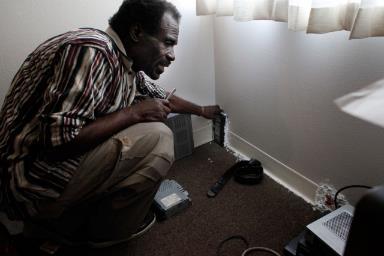
Eddie Williams, 62, glues items such as videocassettes to his walls to stop mice from getting into his Nevin Plaza apartment. Williams, whose rent is $251 a month, asked the Richmond Housing Authority to fix the problem, but he says nothing happened.(Lacy Atkins/San Francisco Chronicle)
Most residents don’t keep track of when they file a complaint; they get no receipt. Some verbally tell staff about their maintenance problems, but those reports don’t always make it into written records. To tell this story, CIR focused on the recent complaints of three residents who kept track of when they first notified housing authority officials.
It appears the agency is marking resident complaints as being addressed when they’re not. In all three cases, the authority’s records indicate that problems in their apartments were fixed. Residents say the issues were not resolved.
Wardell Jones is a blind Air Force veteran. He’s 83 years old. His Nevin Plaza apartment is covered in canvases he has learned to paint at the local blind center. They are full of brightly colored landscapes. His daughter comes by almost every day to fill his palette with paint.
His heater has been broken for more than a year, he said.
The housing authority said it fixed his heat in October, paying $140 for new parts, according to records. But Jones says his heat hasn’t worked since he first complained more than a year ago. As the temperature dipped near freezing, he would feel his way to his kitchen and use his open oven to combat the cold.
Jones lives about 10 feet from the apartment of the housing authority’s live-in maintenance worker.
For Eaton, the housing authority said it eliminated the swarms of cockroaches in her apartment on Oct. 8. However, a CIR reporter visited Eaton that day and saw the housing authority contractor enter her apartment. He walked around and acknowledged the problem. He left and didn’t come back. That maintenance visit was marked as a completed work order, according to housing authority records.
When Everett Dennis Lewis had mice infesting his apartment in January last year, the housing authority’s records say it sent an exterminator within two weeks of his complaint. But Lewis said exterminators never came, and he ended up buying traps himself.
Lewis, who is 61, said he has had nothing but problems since moving into Hacienda almost two years ago. Last year, the toilet in the room above him leaked raw sewage through the ceiling into his bathroom. It dripped on him from above.
He called the housing authority’s emergency maintenance line, and a worker told Lewis that they would fix it. But when nothing had happened after a week, Lewis called the same maintenance hotline five or six times a day.
“I really annoyed them,” he said. “I just got tired of the poop falling on me.”
He said the leak finally was repaired after almost a month of multiple daily complaints.
But in the housing authority’s records, Lewis’ complaint shows up once, and it says the agency fixed the problem the day after he complained.
Tim Jones, the agency’s executive director, declined to answer questions about the resident complaints and many other specifics about conditions at Hacienda and Nevin Plaza.
Other residents tell similar stories. A caregiver for a 68-year-old man said water dripped for months in his living room from a corroded exposed pipe in the ceiling. The lock on one woman’s front door hasn’t worked for four years. Another resident tried to get his leaky shower handle fixed. He ended up with a hole in his wall, no water in his shower for two months and a $50 bill for asbestos removal that he had to pay.
Failed promises, fading hopes
The Hacienda complex is a tan, six-story high-rise in central Richmond, off Roosevelt and Barrett avenues. Public housing residents in Richmond call it the most problematic of the city’s five complexes.
Feral cats mill around the ivy that surrounds Hacienda, feasting on the mice that infest the building. Drug dealers glide through a perpetually broken security gate at the front of the complex and roam around with impunity. Squatters break locks and occupy the abandoned apartments on the sixth floor. Chronic roof leaks have allowed blue and green mold to spread on the outer walls, covering the ceilings of Hacienda’s sixth-floor walkways.
Drug dealers and prostitutes routinely sneak into the building from three different entrances.
Hacienda has paid security guards, but they admit that the place intimidates them.
“I’m scared to do my patrols,” said Arielle Jackson, a security guard for Cypress Private Security.
The housing authority pays Cypress $300,000 a year to secure both Nevin Plaza and Hacienda. Richmond police Officer Giulia Colbacchini said, “The security guards here are a joke.”
Cypress declined to comment for this story.
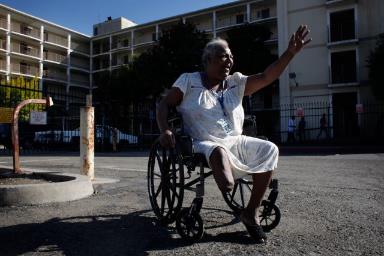
Rhonda Marshall, 58, waves to visitors outside the Hacienda public housing complex. She’s been living on the high-rise’s first floor for years and has watched the building deteriorate. She says she sees cracks in the walls running from the sixth floor to the ground and smells mold in the hallways and stairwells. (Lacy Atkins/San Francisco Chronicle)
There are a dozen light posts in Hacienda’s courtyard, but for more than two years, none worked. At night, Rhonda Marshall stumbled in her wheelchair getting from her apartment to a back gate across the courtyard, rolling off uneven paths in the darkness.
“It’s so dark you can’t see your hands in front of you,” the 58-year-old said.
The housing authority paid $1,850 to a contractor to install new light fixtures in Hacienda’s courtyard in August 2011. But residents say the lights worked for only two or three days, and after that, they tolerated the pitch black. The housing authority finally fixed the lights in the courtyard in December. Residents say they have complained since 2011. CIR has records going back one year, which verify the complaints stretch back at least that far.
On the sixth floor, exposed wires dangle from an abandoned electrical closet, a few feet from an inhabited unit. The wires are within reach of children who visit their grandparents in the complex.
Residents call Hacienda the “Haci-hellhole” or “Bedbug City.” Nearly everyone has a story of bedbugs, and residents collect them in mason jars to show to housing authority maintenance workers, in an attempt to prove they aren’t making up the source of their pockmarked arms.
Almost one-fifth of the apartments in Hacienda were infested with bedbugs, according to the most recent federal inspection in 2012. Exterminators have been called at least nine times in the last year, but residents say the place still is overrun with the blood-sucking pests.
Residents used to have more hope. In 2009, the bedbug situation became so dire at Hacienda that residents signed a petition, stormed the City Council chamber and “raised so much hell” that the housing authority was forced to fumigate the entire building, said Eaton, the Hacienda resident who struggled with mice and cockroaches.
No one wants to do that now. Walk around Hacienda and Nevin Plaza, and almost every resident will tell you a personal anecdote about the housing authority’s failed promises to provide the basics.
Eaton has lost any hope that the agency will help. After months of complaints, contractors gave her a few sticky pads for the mice in her apartment. She bought her own mouse poison, and the infestation has improved.
“Who even wants to try anymore?” she said. “I wanna go someplace else, but I don’t have anywhere else to go. They treat us like animals here.”
It’s a feeling shared by many residents.
“I’m afraid that the building’s going to come down on me,” Marshall said. “I want out of here.”
Structural dangers noted
Federal inspectors worried about the building’s foundation, too.
Cracks snake their way along the seams of Hacienda. In early January, reporters saw the walkway on Hacienda’s sixth floor separating from the main building by almost 2 inches. The cracks are so large that you can see down to the fifth floor. These were some of the same problems inspectors warned of years earlier.
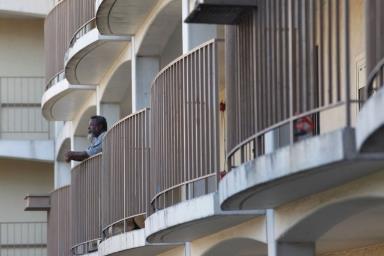
Many residents of the Hacienda housing complex call it “Haci-hellhole”or “Bedbug City.” One-fifth of the building’s apartments were infested with bedbugs, according to a 2012 federal inspection. (Lacy Atkins/San Francisco Chronicle)
In 2009, HUD noted that Hacienda’s foundation was separating from the walls. One- to 4-inch gaps were cited on all six floors, according to federal reports.
HUD officials gave the separated foundation its most extreme rating on the books. Major foundation problems can lead to the instability of an entire building. It’s unclear whether Richmond has a plan to make repairs.
Federal inspectors in 2009 and then again in 2011 also warned of severe problems with the roof. In 2009, an entire electrical closet’s walls were “saturated with water mold and mildew” due to the leaking roof, they said.
The housing authority has hired contractors to stop the roof from leaking since 2006, but it hasn’t gotten fixed. Even after the housing authority paid the most recent contractor $8,000 a few months ago, the roof still was leaking, according to a housing authority receipt. One contractor didn’t even finish the job years before, according to housing authority records.
The damage proved to be a blessing for squatters.
At one point, the housing authority had cleared out residents on the sixth floor. Security is almost nonexistent, so squatters have a practically guaranteed place to crash.
A squatter named Steve Muccular recently took reporters through the building, showing them how to break into Hacienda through a busted security gate in the front of the building. Security guards don’t bother to venture up to the sixth floor, he said, so he camped in the laundry room for months.
“No one was supposed to be up here,” Muccular said. “But they don’t check. This is a fucked-up building for sure.”
An abandoned unit on the sixth floor had clear signs of squatting in January – a broken security door and an apartment full of old birthday cake, beer bottles and tattered clothes. Months earlier, workers said they had secured that very unit to prevent squatting, records show.
Unable to get basic help from the housing authority, residents often turn to prayer.
On a recent Tuesday, about 15 Nevin Plaza residents gathered in the first-floor common room for their afternoon prayer group.
“There are a lot of things going on in here that people’s unhappy with but they don’t want to say because they don’t want to get kicked out,” said Eddie Williams, the resident pastor who lives on the second floor. “But since we started praying, people’s not as scared.”

This story was produced by The Center for Investigative Reporting in partnership with the San Francisco Chronicle and KQED. Learn more about CIR’s work.
Residents go around in a circle giving testimonials and recounting their challenges during the week. One woman thanks God for helping her overcome a painkiller addiction. Another is grateful for a successful hip surgery. Then it’s 81-year-old Helen “Mama” Hall’s turn.
“I thank God for giving me discernments and opening my eyes to see more stuff going on in here,” Hall said. She is a self-appointed volunteer security guard who has taken it upon herself to police Nevin Plaza against criminals sneaking into the building. “I thank God for giving me strength to look out for this place every day, because no one else is going to.”
There was a chorus of amens.
“We all gotta look up to God for help,” Williams said. “Because when you look down, it ain’t good where we are.”
The piece was edited by Andrew Donohue and Mark Katches and copy edited by Nikki Frick and Christine Lee. Reporter Amy Julia Harris can be reached at aharris@cironline.org.
Filth, fear besiege tenants of Richmond's housing agency
Mismanagement lands agency on HUD troubled list as residents suffer
Image 1 out of 39
A resident checks out noise at the Hacienda complex.
Amy Julia Harris, The Center for Investigative Reporting
February 17, 2014 | Updated: February 17, 2014 12:06am
Geneva Eaton has learned to deal with life in the Richmond Housing Authority's Hacienda high-rise: the stench of mold from the stairwell in front of her door, the winter she spent huddled at her stove for heat, the broken security gate that allows drug dealers and squatters to walk past the security guards and urinate on her doorstep. But the mice were too much.
For eight months, the 73-year-old woke to half-dead mice wriggling in the glue traps lining the floors and cupboard of her apartment. She went to bed with the lights on, afraid that the vermin she heard chewing through her walls would bite her in her sleep. She threw out food she could barely afford.
Officials at the Richmond Housing Authority know that the Hacienda, one of its five public housing projects, is infested with mice and cockroaches. Residents have filed more than 80 complaints about it in the past year, according to agency records. But maintenance workers had done little to fix the problem.
Eaton lives in one of the worst apartment buildings managed by one of the worst public housing agencies in the country - one that receives $26 million a year from the federal government to provide 715 units of public housing for the needy.
That housing is supposed to be safe and decently maintained. Instead, some of the poorest, oldest and most vulnerable people in the Bay Area live in squalor and fear due to the housing agency's mismanagement and neglect, the Center for Investigative Reporting has found.
There were at least 16 life-threatening health and safety violations at the five public housing projects managed by the Housing Authority, according to the two most recent years of U.S. Department of Housing and Urban Development reports.
Baths from a sink
Then there are the indignities that don't show up in formal government reports: A woman with no legs giving herself sponge baths from her bathroom sink because maintenance workers didn't install a safety bar in her shower. A disabled man who watched for nearly a month as raw sewage dripped from the neighbor's bathroom upstairs. A blind man who has gone for months without heat.
Residents say their pleas for basic maintenance are ignored. The Center for Investigative Reporting found a number of cases in which Housing Authority workers claimed to have fixed problems, but they hadn't.
Eaton was one of those residents. She took to bathing her walls in bleach in hopes of driving away the roaches.
The Housing Authority said it eliminated the swarms of mice and cockroaches in her apartment on Oct. 8. However, a reporter visited Eaton that day and saw the Housing Authority contractor enter her apartment, acknowledge the problem and leave. That visit was marked as a completed work order, according to agency records.
"It's just continual chaos here," said Everett Dennis Lewis, a disabled resident of the Hacienda. "The Housing Authority doesn't give a crap."
Troubled list
There are 4,055 public housing agencies in the United States, all overseen by HUD. Last year, the federal government labeled 44 as "troubled" - housing authorities that had such severe problems with their finances, management or living conditions that the government was on the brink of shutting them down.
San Francisco landed on the list, after maintenance problems and allegations that former Executive Director Henry Alvarez had steered two contracts to favored bidders came to light.
Richmond's problems were even more severe than San Francisco's, according to HUD's ranking system. In the most recent federal assessment reports, released in 2013, Richmond received a score of 47 out of 100, one of the lowest rankings in the country. When San Francisco made the list, its score was 54.
Richmond received failing marks for running up debt and failing to track its finances. Its executive director was deemed ineffective.
Leadership failures
Richmond managed to receive a passing grade for the condition of most of its apartments. But the breakdown in finances and leadership manifests itself daily at Richmond's two largest complexes - the Hacienda and Nevin Plaza, just down the street from City Hall - as residents struggle with rodents, filth and security problems.
"They are a dysfunctional organization," said Gerard Windt, division director of the HUD office that oversees Richmond.
The authority's executive director, Tim Jones, said he's "running an operation on life support." He blamed years of budget cuts from the federal government for the problems plaguing the Housing Authority and said the agency is on the road to recovery.
The Hacienda housing project is a six-story complex in central Richmond, off Roosevelt and Barrett avenues. Public housing residents in Richmond call it the most problematic of the city's five complexes.
Feral cats mill around the ivy that surrounds the Hacienda, feasting on the mice that infest the building. Drug dealers glide through a broken security gate and roam with impunity. Squatters occupy abandoned apartments. Roof leaks have allowed mold to spread on the outer walls, covering the ceilings of the Hacienda's sixth-floor walkways.
The Hacienda has security guards, but they admit that the place intimidates them.
"I'm scared to do my patrols," said Arielle Jackson, a security guard for Cypress Private Security. The company declined to comment for this story.
Residents call Hacienda the "Haci-hellhole" or "Bedbug City." They collect the bedbugs in Mason jars to show to Housing Authority maintenance workers, in an attempt to prove they aren't making up the source of their pockmarked arms.
Almost one-fifth of the apartments in Hacienda were infested with bedbugs, according to the most recent federal inspection in 2012. Exterminators have been called at least nine times in the past year, but residents say the place still is overrun with the blood-sucking pests.
Eaton, the Hacienda resident who struggled with mice and cockroaches, has lost any hope that the agency will help. After months of complaints, contractors gave her a few sticky pads for the mice in her apartment. She bought her own mouse poison, and the infestation has improved.
"Who even wants to try anymore?" she said. "I want to go someplace else, but I don't have anywhere else to go. They treat us like animals here."
Structural dangers
Hacienda's problems extend to its very foundation.
Five years ago, HUD noted that Hacienda's foundation was separating from the walls. Gaps of 1 to 4 inches were cited on all six floors, according to federal reports.
Major foundation problems can lead to the instability of an entire building. It's unclear what Richmond has done to make repairs, but in early January, reporters saw the walkway on Hacienda's sixth floor separating from the main building by almost 2 inches.
Federal inspectors also warned in 2009 and 2011 of severe roof problems. In 2009, an entire electrical closet's walls were "saturated with water mold and mildew" due to the leaking roof, they said. The Housing Authority has hired roofing contractors, but the roof still leaks.
The damage at Hacienda has proved to be a blessing for squatters. At one point, the Housing Authority cleared out residents on the sixth floor, and with security almost nonexistent, squatters found a guaranteed place to crash.
One, Steve Muccular, said he had entered through a broken security gate and camped in the laundry room for months.
"No one was supposed to be up here," Muccular said. "But they don't check."
Looking elsewhere
Unable to get basic help from the Housing Authority, residents often turn to prayer.
On a recent Tuesday, about 15 residents of the Nevin Plaza public housing complex gathered in the first-floor common room for their afternoon prayer group. "Since we started praying, people's not as scared," said Eddie Williams, the resident pastor.
Residents go around in a circle giving testimonials and recounting their challenges. During one recent session, it was 81-year-old Helen "Mama" Hall's turn.
"I thank God for giving me discernments and opening my eyes to see more stuff going on in here," Hall said. She has taken it upon herself to police Nevin Plaza against criminals sneaking into the building.
"I thank God for giving me strength to look out for this place every day," Hall said, "because no one else is going to."
Subsidized squalor
Monday: In apartments managed by the Richmond Housing Authority, some of the most vulnerable people in the Bay Area live in squalor and fear due to the housing agency's mismanagement and neglect.
Tuesday: As the Richmond Housing Authority's finances spiraled out of control and residents' basic needs went ignored, officials at the agency continued to mismanage funds and spend lavishly on meals.
Exclusive to print readers at SFChronicle.com: Video interviews with residents, additional photos and a spoken-word project by Richmond poets.
This story was produced by the Center for Investigative Reporting, a nonprofit, independent newsroom in the Bay Area, in partnership with The Chronicle and KQED. E-mail: aharris@cironline.org
Travails of tenants in Richmond Housing Authority complexes
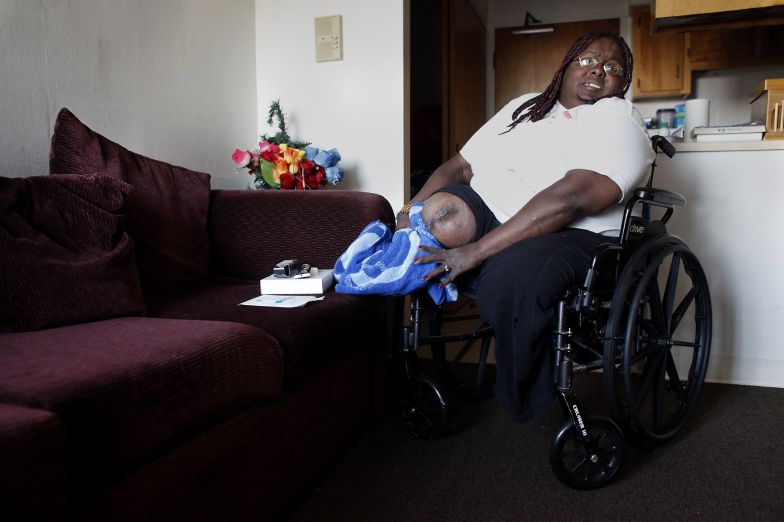
Lacy Atkins, The Chronicle
Juanita Hasnat finally got the bathtub grab bar she needed installed in her Nevin Plaza apartment.
February 17, 2014
Everett Dennis Lewis: Raw sewage leaked on him for weeks till it was fixed
Everett Dennis Lewis, 61, said he has had nothing but problems since moving into the six-story Hacienda public housing complex almost two years ago.
Last year, the toilet in the unit above him leaked raw sewage through the ceiling into his bathroom. It dripped on him.
He called the Housing Authority's emergency maintenance line, and a worker told Lewis that someone would fix it. When nothing happened after a week, Lewis started calling the same maintenance hot line five or six times a day.
"I really annoyed them," he said. "I just got tired of the poop falling on me."
He said the leak finally was repaired after almost a month - he documented it on his calendar. But in the Housing Authority's records, Lewis' complaint shows up once, and it says the agency fixed the problem the day after he complained.
Wardell Jones: Vet, 83 and blind, must open his oven door for warmth - heater broken for a year
Wardell Jones is a blind Air Force veteran. He's 83 years old and says the heater in his Nevin Plaza apartment has been broken for more than a year.
The Housing Authority says its records show the agency fixed his heat in October, paying $140 for new parts. But Jones says his heat hasn't worked since he first complained more than a year ago. As the temperature dipped near freezing, he would feel his way to his kitchen and use his open oven to combat the cold.
A reporter visited Jones' apartment and confirmed that his heat didn't work.

Lacy Atkins, The Chronicle
Everett Dennis Lewis (right) enjoys a party in the Hacienda complex with Rhonda Marshall.
Jones lives about 10 feet from the apartment of the Housing Authority's live-in maintenance worker.
Juanita Hasnat: Tenant spent months trying to get safety grab bar for bathtub
When Juanita Hasnat moved into Nevin Plaza in 2011 - a 142-unit complex down the street from Richmond City Hall - the Housing Authority knew she was disabled. But her apartment didn't have a basic accessibility fixture: a safety bar in the bathtub.
Hasnat told the authority about the oversight, thinking it would be a quick fix. But it took the agency nine months to install the safety bar, a fixture that costs less than $40 at the Home Depot.
The 47-year-old gave herself sponge baths out of her bathroom sink for months because she couldn't maneuver out of her wheelchair and into her bathtub.
Hasnat said she had repeatedly called the Housing Authority and its executive director, Tim Jones, to ask for help.
"They all said, 'We're going to get it taken care of,' " she said. "But I didn't believe them. These people say one thing and do the opposite."
The Housing Authority declined to comment, saying officials couldn't talk about individual cases.
Under threat of federal takeover, housing agency starts making changes
Feb 17, 2014
Amy Julia Harris
Topic(s):
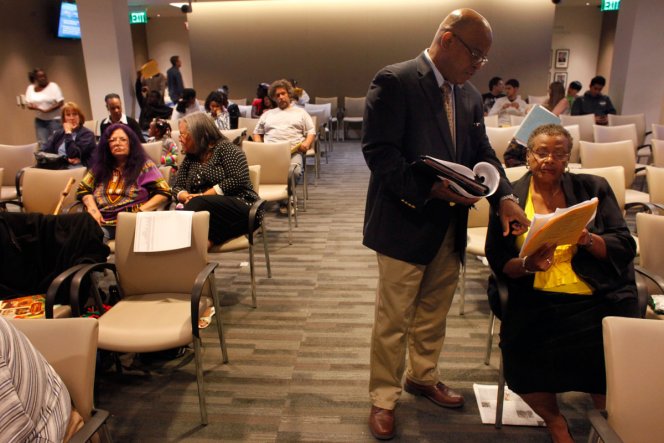
Tim Jones (center), executive director of the Richmond Housing Authority, saw his salary increase about 30 percent over three years as his agency ran up debt. This occurred at a time when the housing authority didn’t have enough money to make payroll.
RICHMOND, Calif. – The problems at the Richmond Housing Authority aren’t new – and neither are the plans to fix it.
In 2005, Richmond had serious financial and management problems. It was in debt, paperwork was in disarray, and staff were untrained and ineffective, according to the U.S. Department of Housing and Urban Development. HUD devised a detailed plan to overhaul the agency.
But the problems continued. Since 2009, the housing authority has landed on HUD’s troubled list for not taking care of its finances or reining in its debt.
HUD auditors said one of the reasons Richmond kept sliding backward was because it hid the dysfunction from city and HUD officials. They particularly targeted Executive Director Tim Jones for withholding information and not responding to emails.
“There was an extreme lack of cooperation by Richmond Housing Authority management staff,” according to a 2012 HUD memo. “Documents requested were either not provided, wrong documents provided, or the RHA staff appeared to purposely delay providing documents.”
Now that HUD has threatened to take over the housing authority, Richmond officials have begun to make changes.
HUD’s current plan for improving Richmond is almost identical to the one it handed Richmond when it faced similar problems in 2005: Get its finances under control. Get a handle on the debt. Improve its contracting system. Keep the books in order.
In 2012, the city seized control of the housing authority’s finances. Federal officials say Richmond so far has met its improvement deadlines.
“Going forward, there are good things happening at the housing authority,” said Bill Lindsay, the city manager.
The housing authority is trying to wipe out its $7 million debt – nine years after it first became a problem.
It’s in the process of selling off a $40 million, 400-unit apartment complex that it bought a decade ago. It was supposed to be a long-term source of money for the housing authority, bringing in $164,000 in 2013. Now, its sale is being used as a one-time payout to repay the debt and $2.2 million in federal fines for past contracting mistakes.
The agency says it has a solution to get out of its public housing crisis: Convert most of its public housing to private management under the Section 8 voucher program. By 2016, the housing authority plans to spend $65 million in public and private financing to modernize four of its five housing projects and privatize them.
However, Richmond’s worst housing project is the one complex that’s not part of the rehab.
Instead, housing authority officials have talked about eventually selling or demolishing the building. Hacienda, which has 150 units for mainly elderly and disabled residents, has been the biggest source of problems for the housing authority. Many residents live in squalor from pest infestations, mold and roof leaks.
It’s unclear what would happen to them if the building were demolished. In the meantime, the housing authority has been spraying the complex to combat its infestation problems and is looking for a contractor to fix its roof.
Richmond’s Section 8 program hasn’t been a model for success, either. It also was labeled one of the worst in the country for major mismanagement and disorganization, according to federal audits.
Any agency that scores below 60 percent is labeled troubled. Richmond received a 13 percent rating in 2011 and has been on the Section 8 troubled list almost every year since 2008, according to federal data. It got off the troubled list in 2012, with a score of 74.
The housing authority doesn’t deal with property management in the Section 8 program, but it was failing in basic bookkeeping.
It was not ensuring that life-threatening health and safety violations in residents’ apartments were corrected within 24 hours, was not properly selecting people off the waiting list and had been miscalculating how much tenants owed in rent each month, according to federal audits.
For their part, residents aren’t optimistic about things changing in Richmond anytime soon.
“We’re out here suffering,” said 73-year-old Geneva Eaton, a longtime Hacienda tenant. “The housing authority doesn’t care. And they won’t fix it.”
This story was edited by Andrew Donohue. It was copy edited by Nikki Frick and Christine Lee.
|
|

